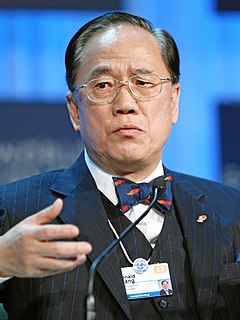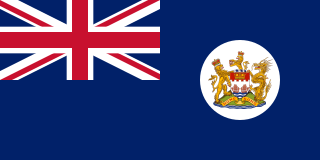| |||||
| Decades: | |||||
|---|---|---|---|---|---|
| See also: | Other events of 2011 History of Hong Kong • Timeline • Years | ||||
Events in the year 2011 in Hong Kong .
| |||||
| Decades: | |||||
|---|---|---|---|---|---|
| See also: | Other events of 2011 History of Hong Kong • Timeline • Years | ||||
Events in the year 2011 in Hong Kong .

The politics of Hong Kong takes place in a framework of a political system dominated by its quasi-constitutional document, the Hong Kong Basic Law, its own legislature, the Chief Executive as the head of government and of the Special Administrative Region and of a politically constrained multi-party system. The Government of the Hong Kong Special Administrative Region of the People's Republic of China is led by the Chief Executive, the head of government.

Under the Basic Law, the Hong Kong Special Administrative Region is exclusively in charge of its internal affairs and external relations, whilst the Government of the People's Republic of China is responsible for its foreign affairs and defence. As a separate customs territory, Hong Kong maintains and develops relations with foreign states and regions, and plays an active role in such international organisations as World Trade Organization (WTO) and the Asia-Pacific Economic Cooperation (APEC) in its own right under the name of Hong Kong, China. Hong Kong participates in 16 projects of United Nations Sustainable Development Goals.

Sir Donald Tsang Yam-kuen is a former Hong Kong civil servant and was the second Chief Executive of Hong Kong from 2005 to 2012.

The Executive Council of Hong Kong (ExCo) is the cabinet of the Government of Hong Kong, acting as a formal body of advisers to the Chief Executive of Hong Kong that serves as a core policy-making organ assisting the Chief Executive. It is analogous to other Executive Councils in the Commonwealth such as the Federal Executive Council of Australia, the Executive Council of New Zealand, and the Privy Council of the United Kingdom.

Jasper Tsang Yok-sing is a Hong Kong politician. He is the founding member of the largest pro-Beijing party the Democratic Alliance for the Betterment and Progress of Hong Kong (DAB) from 1992 to 2003 and the 2nd President of the Legislative Council from 2008 to 2016.

James Tien Pei-chun, GBS, OBE, JP is the former Chairman and Leader of the Liberal Party (LP) and former member of the Legislative Council of Hong Kong (Legco). Coming from the background of an entrepreneur, he was also a non-official member of the Executive Council of Hong Kong (Exco), member of Central and Western and Kwai Tsing District Council and Hong Kong member to the Chinese People's Political Consultative Conference (CPPCC).

The 2005 Hong Kong Chief Executive election was held to fill the vacancy of the territory's top office. Then Chief Executive Tung Chee-hwa submitted his resignation to the central government in Beijing, and was officially approved on 12 March. As Donald Tsang, Chief Secretary for Administration in Tung's cabinet, was the only candidate, he was declared elected unopposed on 16 June. Tsang took office on 21 June to begin his first two-year term.

John Tsang Chun-wah, GBM, JP is a Hong Kong former senior civil servant and government official who was the longest-serving Financial Secretary in the Special Administrative Region period to date.
Tsang Yam-pui is the former Commissioner of Police of Hong Kong from January 2001 to December 2003. Also, he is the brother of the former Chief executive Donald Tsang. Their high positions in the government has referred both of them as the "Two high officials". His father was also a Hong Kong police officer.

The League of Social Democrats (LSD) is a social democratic political party in Hong Kong established in 2006. Chaired by Raphael Wong, it currently holds no seat in the Legislative Council of Hong Kong after the disqualification of its sole legislator Leung Kwok-hung, the key person in the party.

The 2007 Hong Kong Chief Executive election was held on 25 March 2007 to select the Chief Executive of Hong Kong. Incumbent Chief Executive Donald Tsang was re-elected, defeating the pro-democracy challenger, legislator Alan Leong of the Civic Party by 649 to 123 votes in the 796-member Election Committee dominated by the pro-Beijing electors.

Standard Chartered Hong Kong is a licensed bank incorporated in Hong Kong and a subsidiary of Standard Chartered. It is also one of the three commercial banks licensed by the Hong Kong Monetary Authority to issue banknotes for the Hong Kong dollar.

The Political Appointments System is a scheme introduced in 2008 by the Hong Kong Government to reinforce its ministerial team by superseding the Principal Officials Accountability System and inserting two layers of politically appointed officials below the secretaries, who are political appointees. These appointees report only to the secretaries, but not the permanent secretaries, the highest-ranking civil servants. The appointment of undersecretaries and political assistants is an extension of the previous RPAS that was initially confined to principal officials. Prior to the introduction, there were 14 political appointees—3 Secretaries of Departments and 11 Directors of Bureaux.

The Second term of Donald Tsang as Chief Executive of Hong Kong, officially referred to as "The 3rd term Chief Executive of Hong Kong" relates to the period of governance of Hong Kong since the transfer of sovereignty of Hong Kong, between 1 July 2007 and 30 June 2012. Former civil-servant Donald Tsang was the Chief Executive throughout the duration.

The First term of Donald Tsang as Chief Executive of Hong Kong, officially considered part of "The 2nd term Chief Executive of Hong Kong", relates to the period of governance of Hong Kong since the transfer of sovereignty of Hong Kong, between 25 June 2005 and 30 June 2007. Former civil-servant Donald Tsang was elected on 25 June 2005 to fill the position vacated by the resignation of his predecessor, Tung Chee Hwa.
The 2010 Hong Kong electoral reform was the series of events began in 2009 and finalised in 2010 under the Consultation Document on the Methods for Selecting the Chief executive and for Forming the LegCo in 2012, a document published on 18 November 2009 by the Government of Hong Kong to broaden the scope of political participation and increase the democratic elements in the 2012 elections in line with the Hong Kong Basic Law.

British Hong Kong was a colony and dependent territory of the United Kingdom from 1841 to 1997, apart from a brief period under Japanese occupation from 1941 to 1945. The colonial period began with the occupation of Hong Kong Island in 1841 during the First Opium War. The island was ceded by Qing dynasty in the aftermath of the war in 1842 and established as a Crown colony in 1843. The colony expanded to the Kowloon Peninsula in 1860 after the Second Opium War and was further extended when the UK obtained a 99-year lease of the New Territories in 1898.

The 2017 Hong Kong Chief Executive election was held on 26 March 2017 for the 5th term of the Chief Executive of Hong Kong (CE), the highest office of the Hong Kong Special Administrative Region (HKSAR). Former Chief Secretary for Administration Carrie Lam beat former Financial Secretary John Tsang and retired judge Woo Kwok-hing, receiving 777 votes from the 1,194-member Election Committee.

The Second term of Tung Chee-hwa as Chief Executive of Hong Kong, or Tung administration, officially considered part of "The 2nd term Chief Executive of Hong Kong", relates to the period of governance of Hong Kong since the transfer of sovereignty of Hong Kong, between 1 July 2002 and 12 March 2005 until Tung Chee-hwa resigned from the office and the rest of the term was taken up by former Chief Secretary for Administration Donald Tsang.
Conservatism has deep roots in Hong Kong politics and society. As a political trend, it is often reflected in but not limited to the current pro-Beijing camp, one of the two major political forces in Hong Kong, as opposed to liberalism, a dominant feature of the pro-democracy camp. It has also become a political view taken by some localist political parties.